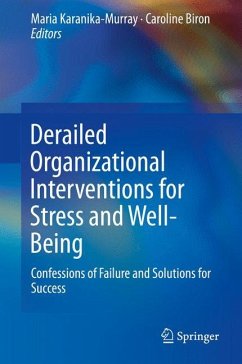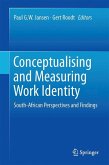Derailed Organizational Interventions for Stress and Well-Being
Confessions of Failure and Solutions for Success
Herausgegeben:Karanika-Murray, Maria; Biron, Caroline
Derailed Organizational Interventions for Stress and Well-Being
Confessions of Failure and Solutions for Success
Herausgegeben:Karanika-Murray, Maria; Biron, Caroline
- Gebundenes Buch
- Merkliste
- Auf die Merkliste
- Bewerten Bewerten
- Teilen
- Produkt teilen
- Produkterinnerung
- Produkterinnerung
Providing an overview of researchers' and practitioners' "confessions" on the fascinating phenomenon of failed or derailed organizational health and well-being interventions and contextualizing these confessions is the aim of this innovative volume. Organizational intervention failures, paradoxes and unexpected consequences can offer a lot of rich and extremely useful practical lessons on intervention design and implementation and possibly on the design of future research on organizational interventions. This volume presents lessons learned from derailed interventions and provides possible…mehr
Andere Kunden interessierten sich auch für
![Psychosocial Factors at Work in the Asia Pacific Psychosocial Factors at Work in the Asia Pacific]() Psychosocial Factors at Work in the Asia Pacific77,99 €
Psychosocial Factors at Work in the Asia Pacific77,99 €![The Social Developmental Construction of Violence and Intergroup Conflict The Social Developmental Construction of Violence and Intergroup Conflict]() The Social Developmental Construction of Violence and Intergroup Conflict77,99 €
The Social Developmental Construction of Violence and Intergroup Conflict77,99 €![Conceptualising and Measuring Work Identity Conceptualising and Measuring Work Identity]() Conceptualising and Measuring Work Identity77,99 €
Conceptualising and Measuring Work Identity77,99 €![Critical Studies in Diversity Management Literature Critical Studies in Diversity Management Literature]() George GotsisCritical Studies in Diversity Management Literature47,99 €
George GotsisCritical Studies in Diversity Management Literature47,99 €![Occupying Disability: Critical Approaches to Community, Justice, and Decolonizing Disability Occupying Disability: Critical Approaches to Community, Justice, and Decolonizing Disability]() Occupying Disability: Critical Approaches to Community, Justice, and Decolonizing Disability123,99 €
Occupying Disability: Critical Approaches to Community, Justice, and Decolonizing Disability123,99 €![Out of Time Out of Time]() Kadri TähtOut of Time39,99 €
Kadri TähtOut of Time39,99 €![Occupying Disability: Critical Approaches to Community, Justice, and Decolonizing Disability Occupying Disability: Critical Approaches to Community, Justice, and Decolonizing Disability]() Occupying Disability: Critical Approaches to Community, Justice, and Decolonizing Disability123,99 €
Occupying Disability: Critical Approaches to Community, Justice, and Decolonizing Disability123,99 €-
-
-
Providing an overview of researchers' and practitioners' "confessions" on the fascinating phenomenon of failed or derailed organizational health and well-being interventions and contextualizing these confessions is the aim of this innovative volume. Organizational intervention failures, paradoxes and unexpected consequences can offer a lot of rich and extremely useful practical lessons on intervention design and implementation and possibly on the design of future research on organizational interventions. This volume presents lessons learned from derailed interventions and provides possible solutions to those tasked with implementing interventions. It provides an open, practical and solutions-focused account of researchers' and practitioners' experiences in implementing organizational interventions for health and well-being.
Produktdetails
- Produktdetails
- Verlag: Springer / Springer Netherlands
- Artikelnr. des Verlages: 978-94-017-9866-2
- 1st ed.
- Seitenzahl: 312
- Erscheinungstermin: 10. August 2015
- Englisch
- Abmessung: 241mm x 160mm x 23mm
- Gewicht: 604g
- ISBN-13: 9789401798662
- ISBN-10: 9401798664
- Artikelnr.: 42298711
- Herstellerkennzeichnung Die Herstellerinformationen sind derzeit nicht verfügbar.
- Verlag: Springer / Springer Netherlands
- Artikelnr. des Verlages: 978-94-017-9866-2
- 1st ed.
- Seitenzahl: 312
- Erscheinungstermin: 10. August 2015
- Englisch
- Abmessung: 241mm x 160mm x 23mm
- Gewicht: 604g
- ISBN-13: 9789401798662
- ISBN-10: 9401798664
- Artikelnr.: 42298711
- Herstellerkennzeichnung Die Herstellerinformationen sind derzeit nicht verfügbar.
checklist.- Chapter 21 Decreasing response rates in employee health surveys: initial findings from a Longitudinal Stress-management Project in the Workplace.- Chapter 22 Recruitment and retention challenges of a mental health promotion intervention targeting small and medium enterprises.- Chapter 23 Perspectives on randomization and readiness for change in a workplace intervention study.- Part 4 Outcome.- Chapter 24 Ensuring the long-term sustainability of organizational interventions: Potential obstacles to be avoided.- Chapter 25 Creating sustained change: Avoiding derailment during the Last stage of a wellbeing intervention.- Chapter 26 A proper needs assessment is key to starting a wellbeing intervention off right.- Chapter 27 Explaining intervention success and failure: What works, when, and why?.- Chapter 28. The 'best available evidence' could be better: Evidence from systematic reviews of organizational interventions.- Chapter 29 Work analysis and the resolution of organizational conflict: Theoretical method, measurement and application.- Part 5 Concluding Thoughts.- Chapter 30 The highs and lows of occupational stress intervention research: Lessons learnt from collaborations with high-risk industries.- Chapter 31 Stress management interventions: Reflections.- Chapter 32 Concluding thoughts - From black and white to colours: Moving the science of organizational interventions for stress and well-being forward.
Chapter 1 Introduction - Why do some interventions derail? Deconstructing the elements of organizational interventions for stress and well-being.- Part 1 Content.- Chapter 2 Derailed or failed? A closer look at reduced working hours as an occupational health intervention.- Chapter 3 Integrating job stress and workplace mental health literacy intervention: Challenges and benefits.- Chapter 4 Burnout: Why interventions fail and what Can we do differently.- Chapter 5 Managing work-related musculoskeletal disorders - socio-technical 'solutions' and unintended psychosocial consequences.- Part 2 Context.- Chapter 6 Population level interventions to control psychosocial risks: Problems and prospects.- Chapter 7 Derailed, but implemented - A study of two natural work-life interventions.-Chapter 8 Organizational changes torpedoing the intervention.- Chapter 9 Corporate philosophy: Making stress and wellbeing a priority.- Chapter 10 Evidence is not enough: The challenges of engaging organisational stakeholders with different perspectives.- Chapter 11 In line for takeoff...and waiting: Challenges with getting a wellness intervention started in the Military.- Chapter 12 Assessing and addressing the fit of planned interventions to the organizational context.- Part 3 Process.- Chapter 13 Managing conflicts and diversity during implementation of programs and other changes.- Chapter 14 Carnage in the research lab: Power, personality and neglect.- Chapter 15 Power mad: A case of professional services.- Chapter 16 "I Object!" Overcoming obstacles between organizational researchers and legal advisors.- Chapter 17 Challenges of intervention acceptance in complex, multifaceted organizations: The importance of local champions.- Chapter 18 Mutual goals as essential for the results of team coaching.- Chapter 19 Role behavior of the coach and the participants as essential for the results of individual coaching.- Chapter 20 Increasing worker participation: The mental healthaction checklist.- Chapter 21 Decreasing response rates in employee health surveys: initial findings from a Longitudinal Stress-management Project in the Workplace.- Chapter 22 Recruitment and retention challenges of a mental health promotion intervention targeting small and medium enterprises.- Chapter 23 Perspectives on randomization and readiness for change in a workplace intervention study.- Part 4 Outcome.- Chapter 24 Ensuring the long-term sustainability of organizational interventions: Potential obstacles to be avoided.- Chapter 25 Creating sustained change: Avoiding derailment during the Last stage of a wellbeing intervention.- Chapter 26 A proper needs assessment is key to starting a wellbeing intervention off right.- Chapter 27 Explaining intervention success and failure: What works, when, and why?.- Chapter 28. The 'best available evidence' could be better: Evidence from systematic reviews of organizational interventions.- Chapter 29 Work analysis and the resolution of organizational conflict: Theoretical method, measurement and application.- Part 5 Concluding Thoughts.- Chapter 30 The highs and lows of occupational stress intervention research: Lessons learnt from collaborations with high-risk industries.- Chapter 31 Stress management interventions: Reflections.- Chapter 32 Concluding thoughts - From black and white to colours: Moving the science of organizational interventions for stress and well-being forward.
checklist.- Chapter 21 Decreasing response rates in employee health surveys: initial findings from a Longitudinal Stress-management Project in the Workplace.- Chapter 22 Recruitment and retention challenges of a mental health promotion intervention targeting small and medium enterprises.- Chapter 23 Perspectives on randomization and readiness for change in a workplace intervention study.- Part 4 Outcome.- Chapter 24 Ensuring the long-term sustainability of organizational interventions: Potential obstacles to be avoided.- Chapter 25 Creating sustained change: Avoiding derailment during the Last stage of a wellbeing intervention.- Chapter 26 A proper needs assessment is key to starting a wellbeing intervention off right.- Chapter 27 Explaining intervention success and failure: What works, when, and why?.- Chapter 28. The 'best available evidence' could be better: Evidence from systematic reviews of organizational interventions.- Chapter 29 Work analysis and the resolution of organizational conflict: Theoretical method, measurement and application.- Part 5 Concluding Thoughts.- Chapter 30 The highs and lows of occupational stress intervention research: Lessons learnt from collaborations with high-risk industries.- Chapter 31 Stress management interventions: Reflections.- Chapter 32 Concluding thoughts - From black and white to colours: Moving the science of organizational interventions for stress and well-being forward.
Chapter 1 Introduction - Why do some interventions derail? Deconstructing the elements of organizational interventions for stress and well-being.- Part 1 Content.- Chapter 2 Derailed or failed? A closer look at reduced working hours as an occupational health intervention.- Chapter 3 Integrating job stress and workplace mental health literacy intervention: Challenges and benefits.- Chapter 4 Burnout: Why interventions fail and what Can we do differently.- Chapter 5 Managing work-related musculoskeletal disorders - socio-technical 'solutions' and unintended psychosocial consequences.- Part 2 Context.- Chapter 6 Population level interventions to control psychosocial risks: Problems and prospects.- Chapter 7 Derailed, but implemented - A study of two natural work-life interventions.-Chapter 8 Organizational changes torpedoing the intervention.- Chapter 9 Corporate philosophy: Making stress and wellbeing a priority.- Chapter 10 Evidence is not enough: The challenges of engaging organisational stakeholders with different perspectives.- Chapter 11 In line for takeoff...and waiting: Challenges with getting a wellness intervention started in the Military.- Chapter 12 Assessing and addressing the fit of planned interventions to the organizational context.- Part 3 Process.- Chapter 13 Managing conflicts and diversity during implementation of programs and other changes.- Chapter 14 Carnage in the research lab: Power, personality and neglect.- Chapter 15 Power mad: A case of professional services.- Chapter 16 "I Object!" Overcoming obstacles between organizational researchers and legal advisors.- Chapter 17 Challenges of intervention acceptance in complex, multifaceted organizations: The importance of local champions.- Chapter 18 Mutual goals as essential for the results of team coaching.- Chapter 19 Role behavior of the coach and the participants as essential for the results of individual coaching.- Chapter 20 Increasing worker participation: The mental healthaction checklist.- Chapter 21 Decreasing response rates in employee health surveys: initial findings from a Longitudinal Stress-management Project in the Workplace.- Chapter 22 Recruitment and retention challenges of a mental health promotion intervention targeting small and medium enterprises.- Chapter 23 Perspectives on randomization and readiness for change in a workplace intervention study.- Part 4 Outcome.- Chapter 24 Ensuring the long-term sustainability of organizational interventions: Potential obstacles to be avoided.- Chapter 25 Creating sustained change: Avoiding derailment during the Last stage of a wellbeing intervention.- Chapter 26 A proper needs assessment is key to starting a wellbeing intervention off right.- Chapter 27 Explaining intervention success and failure: What works, when, and why?.- Chapter 28. The 'best available evidence' could be better: Evidence from systematic reviews of organizational interventions.- Chapter 29 Work analysis and the resolution of organizational conflict: Theoretical method, measurement and application.- Part 5 Concluding Thoughts.- Chapter 30 The highs and lows of occupational stress intervention research: Lessons learnt from collaborations with high-risk industries.- Chapter 31 Stress management interventions: Reflections.- Chapter 32 Concluding thoughts - From black and white to colours: Moving the science of organizational interventions for stress and well-being forward.








